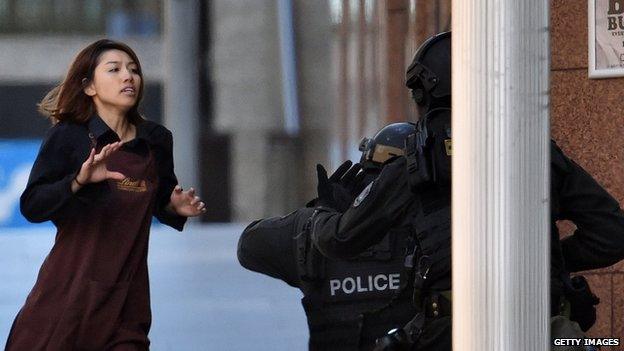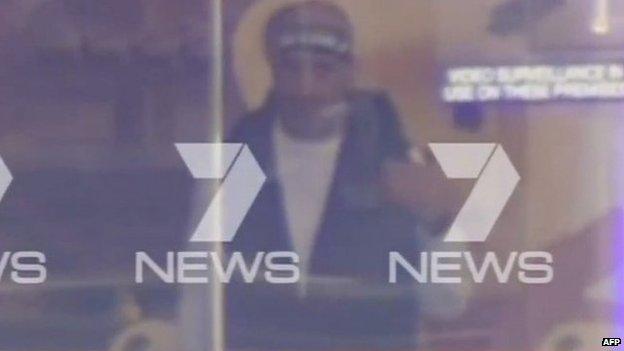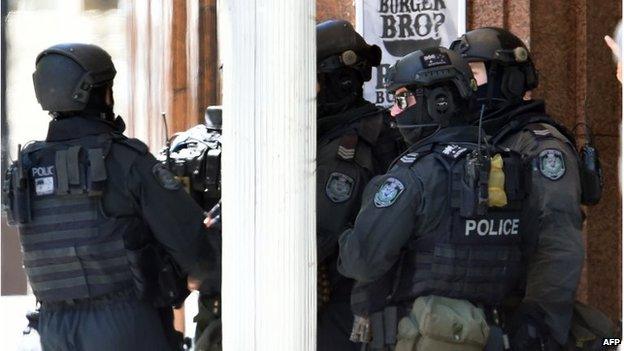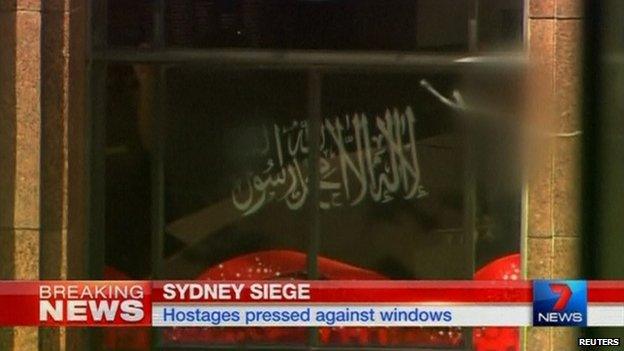Sydney siege: Hostages held in Lindt cafe
- Published
Jon Donnison: Footage showed people fleeing the building
A gunman is holding staff and customers hostage at a cafe in Sydney, Australia.
The Lindt cafe in the city centre is surrounded by armed police. Officers have made contact with the gunman.
Five people have been seen running from the building. It is not clear how many remain inside. A black Islamic flag has been displayed at the window.
Prime Minister Tony Abbott said it was "profoundly shocking" that people were being "held hostage by an armed person claiming political motivation".
He was speaking after chairing a meeting of the national security committee in Canberra.
Earlier Mr Abbott said: "Australia is a peaceful, open and generous society - nothing should ever change that and that's why I would urge all Australians today to go about their business as usual."
Senior police officers say they are on a footing "consistent with a terrorist event".
The mother of one hostage said her son sent a text saying "I'm ok"
The incident began as people were arriving for work in Martin Place on Monday. Witnesses saw a man with a bag and gun walk into the Lindt chocolate shop and cafe.
Lindt said about 10 employees and 30 customers were thought to be inside at the time. Nearby offices were evacuated and police asked people to remain indoors and away from open windows.
The BBC's Jon Donnison in Sydney says an enormous police operation is in place, on a scale few Sydney residents will have seen.

It is not clear whether the five who ran away from the cafe fled or were released
.jpg)
About six hours into the siege, three people were seen running from the building housing the cafe. Two more people followed about an hour later. It is not clear whether they escaped or were released.
New South Wales Police deputy commissioner Catherine Burn said: "Those people are now being assessed to make sure their health is okay and then police will talk to them."
"Our approach is to resolve this peacefully. It might take a bit of time but that is our priority," she added.
Eyewitness Andrea Proctor: "Many police officers started to come around us"
Police have identified the gunman and he is well known to them, Australian media report.
News organisations also say the suspect has contacted them to issue demands, which police have urged media not to report.
Channel 7, a broadcaster with offices facing the cafe, said lights inside the premises were turned out as night fell.

At the scene: Wendy Frew, BBC News, Sydney
The atmosphere in Martin Place itself was surreal. Office workers who had been evacuated from their buildings, construction workers from building sites and tourists packed the pedestrian plaza one block away from the Lindt coffee shop.
Rosemary D'Urso Healion had just come out of the Martin Place subway station and was walking to her office when she saw that it was blocked by police. Then she saw the police close down the subway station.
"I work in that building [where the siege is taking place] and I was just about to go in," she told the BBC, adding that she had been in contact with some of her colleagues who were in the building but not being held hostage.
She remained at Martin Place anxiously watching a police operation that appeared to be aimed at getting some of her colleagues out via a ladder erected on a window ledge on the first floor.


A man wearing a bandana and a backpack was seen inside the cafe

Hundreds of heavily armed police are surrounding the building
An armed man wearing a backpack and a bandana could be seeing walking around inside the cafe.
TV footage showed at least three people, thought to be employees and who were visibly distressed, holding up to the window a black flag bearing the declaration of Islamic faith, which reads: "There is no God but Allah, and Muhammad is his messenger."
The flag is similar to those used by jihadist groups, but is different from the one used by Islamic State militants in the Middle East.
Martin Place is home to the state premier's office and the headquarters of major banks.
In September Australia - which has sent fighter jets to join the US-led coalition conducting air strikes against Islamic State in Iraq - carried out a big anti-terror raid.
One man was charged with plotting to behead a member of the public in Martin Place.
In October, new anti-terrorism laws, including a provision designed to stop Australians fighting in overseas conflicts, were approved by the Australian parliament.

The black flag

A black flag bearing the white Arabic text of the "shahada", the basic statement of the Islamic faith, is used by jihadist groups worldwide
The statement says: "There is no God but Allah, and Muhammad is his messenger"
A black flag was the battle flag of the Prophet Muhammad and was carried into battle by many of his companions
Today, it is used as a symbol of engagement in jihad, in the sense of holy war, by militant groups including al-Qaeda and Islamic State
Islamic State's banner - unlike the flag raised in the window of the coffee shop - bears the first part of the shahada and the seal of the Prophet below it.